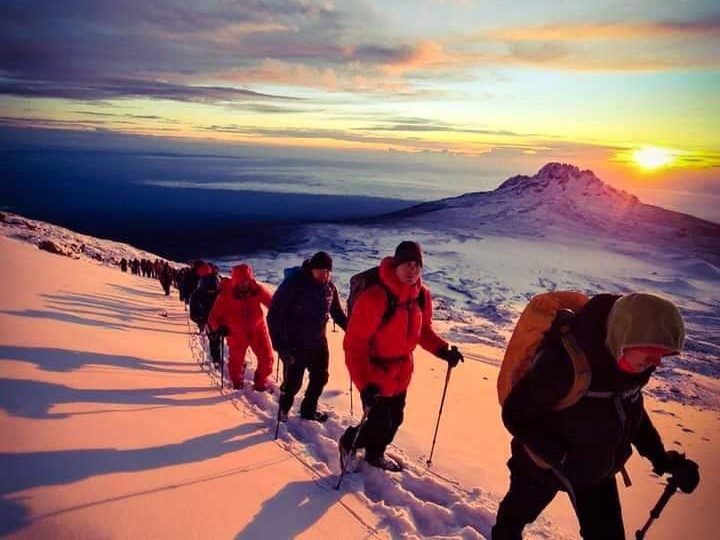Climbing Mount Kilimanjaro is a challenging yet rewarding experience, and one common question many climbers have is: how much weight do you carry on Kilimanjaro? Knowing what to pack and how to distribute your gear is crucial for a successful ascent. In this guide, we will discuss how much weight you will personally carry, the role of porters, and tips to help you minimize your load.

How Much Weight Do You Carry on Kilimanjaro?
As a climber, you are generally expected to carry a daypack with your essential items for the day. This includes things you will need during the hike, such as water, snacks, extra layers of clothing, sunscreen, and a camera. The weight of your daypack should ideally be between 6 to 8 kg (13 to 18 lbs).
Porters are available to help carry the bulk of your gear, and most trekking companies allow you to give the porters a larger duffel bag weighing up to 15 kg (33 lbs).
Breakdown of the Weight You Carry
- Daypack Weight: 6 to 8 kg (13 to 18 lbs)
- Porter-Carried Duffel Bag: Up to 15 kg (33 lbs)
Get expert packing advice with Kilimanjaro Climb Specialist
What Should Be in Your Daypack?
Your daypack should contain items that are easily accessible and needed throughout the day, as the porters will only meet you at camp each evening. Here’s a basic list of what should be in your daypack:
1. Water and Hydration
You should carry at least 2 to 3 liters of water daily. A hydration bladder or reusable water bottles are common choices. Staying hydrated is critical for altitude acclimatization.
2. Clothing Layers
The weather on Kilimanjaro can change rapidly. Pack a rain jacket, fleece, hat, and gloves to adjust to the conditions throughout the day. It’s important to wear lightweight, breathable clothing.
3. Snacks and Energy
Bring high-energy snacks like trail mix, energy bars, or dried fruit to maintain your energy levels during the trek.
4. Personal Items
Your camera, sunglasses, sunscreen, and any medications should also be kept in your daypack.
5. First Aid and Emergency Gear
A small first aid kit, blister plasters, and pain relief are handy for unexpected issues on the trail.
What Do Porters Carry?
On Kilimanjaro, you will have the assistance of porters to carry the bulk of your gear, which will be packed into a duffel bag that the porters carry. The total weight allowed for the porters is limited to 15 kg (33 lbs) per climber. This bag will include your personal items that are not needed during the day’s hike.
Porters typically carry your sleeping bag, camp clothes, toiletries, and additional gear that you won’t need until you arrive at camp.
Explore the role of porters on Kilimanjaro with Eddy Tours Safaris
How to Pack Smart for Kilimanjaro
Packing the right items and reducing unnecessary weight will make your trek more enjoyable. Here’s how to pack smart:
1. Choose Lightweight Gear
Invest in lightweight clothing and gear specifically designed for trekking. Modern fabrics like synthetic insulation and Gore-Tex are lighter and offer better performance in various weather conditions.
2. Only Pack Essentials
While it’s tempting to pack extra items, try to stick to the essentials. Limit your luxury items and focus on things you’ll genuinely need for the trek.
3. Use Compression Bags
Compression bags can help reduce the volume of your clothing and sleeping bag, making it easier to pack and organize your gear in your duffel bag.
Get a full packing list and more tips for your climb
Can You Hire Extra Porters?
Yes, if you feel that 15 kg is not enough for your gear, you can hire an additional porter. This is especially useful if you’re carrying more specialized equipment like camera gear, medical supplies, or if you simply prefer to have a lighter daypack. Extra porters can carry up to an additional 15 kg.
Hiring more porters not only lightens your load but also supports the local economy by providing more employment opportunities for the communities around Kilimanjaro.
Tips for Reducing Weight
1. Rent Gear Locally
Instead of bringing everything from home, consider renting heavier items like sleeping bags, tents, or trekking poles from local providers. This can save weight in your luggage before even arriving in Tanzania.
2. Repack at Your Hotel
Before starting the climb, go through your gear at your hotel. Many climbers find that they can leave unnecessary items in their hotel room or with the tour company for safekeeping.
3. Pack Multi-Purpose Items
Items that serve more than one function can reduce your overall weight. For example, quick-dry towels, convertible pants, and multi-use toiletries can help cut down on bulk.
Learn more about gear rental options with Kilimanjaro Climb Specialist
Frequently Asked Questions (FAQs)
1. Do porters carry all your gear on Kilimanjaro?
No, porters only carry your main duffel bag with items up to 15 kg (33 lbs). You are responsible for carrying your own daypack with essentials such as water, snacks, and personal items.
2. How can I reduce the weight I carry on Kilimanjaro?
Focus on packing lightweight gear, renting heavy items locally, and only bringing essential items. Use compression sacks to minimize the bulk of your clothing and sleeping bag.
3. Is tipping required for porters on Kilimanjaro?
Yes, tipping is customary on Kilimanjaro. Porters work incredibly hard to support climbers, and tipping is an important part of their income. A typical tip for a porter is around $6 to $10 per day.
Find detailed tipping guidelines for Kilimanjaro
Conclusion: Pack Smart and Enjoy the Trek
Understanding how much weight you carry on Mount Kilimanjaro and how to pack efficiently is key to enjoying your climb. By properly distributing your load between your daypack and the porters, you can focus on the incredible experience of summiting Africa’s highest peak. With the right preparation, you’ll ensure a more comfortable and successful trek.
Start preparing for your Kilimanjaro adventure with Kilimanjaro Climb Specialist
Book your Kilimanjaro climb with Eddy Tours Safaris

